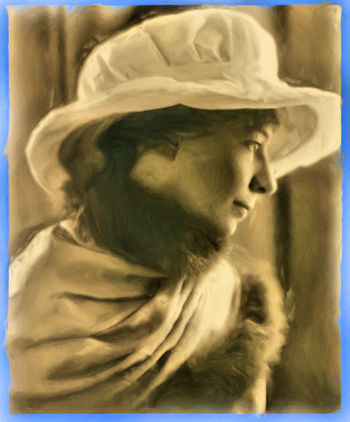
Woolworth Building, Manhattan, Nueva York, diseñado por el arquitecto Cass Gilbert y finalizado en 1913, fue el edificio más alto del mundo hasta 1930. / WIKIPEDIA.
Desde la Torre Woolworth
Vivo de amor, ansiosa de mayor belleza.
De la noche venimos
En el pasillo, brillante y cálido.
Se abre una puerta metálica,
el ascensor nos recibe.
Rápidamente, con vuelo afilado e inquebrantable
la cabina se dispara hacia arriba,
Y el aire, arremolinado y enojado,
aulla como cien demonios.
Más allá del laberinto de puertas de bronce,
constantemente ascendemos.
Me aferro a ti
consciente del abismo bajo nuestros píes,
y un zumbido terrible ensordece mis oídos.
El vuelo ha terminado.
Pasamos por una puerta que conduce a la repisa.
Viento, noche y espacio
Oh altura terrible
¿Por qué te hemos buscado?
Oh viento amargo de heladas alas invisibles
¿Por qué nos azotas?
¿Por qué nos llevarías lejos?
Miramos a través de las millas de aire
Las frías millas azules entre nosotros y la ciudad,
Al borde de la eternidad miramos
En todas las luces
Mil veces más numerosas que las estrellas;
Oh líneas y bucles de luz en cadenas desenrolladas
Esa marca durante millas y millas
La vasta telaraña negra y enredada de las calles;
Cerca de nosotros, racimos y salpicaduras de oro vivo
de lejos cambia a acero azulado
Donde las frágiles luces en la costa de Jersey
tiemblan como gotas de rocío agitado por el viento.
Los estridentes ruidos de la ciudad
flotando hacia nosotros
Son santificados en susurros.
Los transbordadores cruzan la oscuridad
tejiendo un hilo dorado en la noche,
sus silbidos son extrañas sombras de sonido.
Sentimos los millones de seres humanos que están debajo de nosotros,
cálidos millones, moviéndose bajo los techos,
consumidos por sus propios deseos;
preparando comida,
sollozando a solas en una buhardilla,
doblándose sobre una aguja, con los ojos irritados,
leyendo el periódico de la tarde en la intimidad,
Bailando a la luz desnuda de la cafetería,
Enterrando a los muertos,
Dando a luz un niño.
La tristeza, el sopor, la amargura, la alegría frágil.
viene a nosotros
como una niebla fría que nos envuelve.
Oh en cien años
ninguno de estos cuerpos cálidos
serán inútiles como la arcilla.
La angustia, el sopor, el trabajo
habrá pasado a otros millones de seres
consumidos por los mismos deseos.
Las edades vendrán y se irán
la oscuridad borrará las luces
y la torre será derribada.
El mar permanecerá
Negro e inmutable
Las estrellas mirarán hacia abajo
Brillantes y despreocupadas.
Amado,
aunque tristeza, inutilidad, derrota
nos rodean,
No pueden derribarnos.
Aquí en el abismo de la eternidad,
el amor nos ha coronado
Por un momento
Vencedores
Sara Teasdale, poemario Rivers to the Sea
From The Woolworth Tower
Vivid with love, eager for greater beauty
Out of the night we come
Into the corridor, brilliant and warm.
A metal door slides open,
And the lift receives us.
Swiftly, with sharp unswerving flight
The car shoots upward,
And the air, swirling and angry,
Howls like a hundred devils.
Past the maze of trim bronze doors,
Steadily we ascend.
I cling to you
Conscious of the chasm under us,
And a terrible whirring deafens my ears.
The flight is ended.
We pass thru a door leading onto the ledge–
Wind, night and space
Oh terrible height
Why have we sought you?
Oh bitter wind with icy invisible wings
Why do you beat us?
Why would you bear us away?
We look thru the miles of air,
The cold blue miles between us and the city,
Over the edge of eternity we look
On all the lights,
A thousand times more numerous than the stars;
Oh lines and loops of light in unwound chains
That mark for miles and miles
The vast black mazy cobweb of the streets;
Near us clusters and splashes of living gold
That change far off to bluish steel
Where the fragile lights on the Jersey shore
Tremble like drops of wind-stirred dew.
The strident noises of the city
Floating up to us
Are hallowed into whispers.
Ferries cross thru the darkness
Weaving a golden thread into the night,
Their whistles weird shadows of sound.
We feel the millions of humanity beneath us,–
The warm millions, moving under the roofs,
Consumed by their own desires;
Preparing food,
Sobbing alone in a garret,
With burning eyes bending over a needle,
Aimlessly reading the evening paper,
Dancing in the naked light of the café,
Laying out the dead,
Bringing a child to birth–
The sorrow, the torpor, the bitterness, the frail joy
Come up to us
Like a cold fog wrapping us round.
Oh in a hundred years
Not one of these blood-warm bodies
But will be worthless as clay.
The anguish, the torpor, the toil
Will have passed to other millions
Consumed by the same desires.
Ages will come and go,
Darkness will blot the lights
And the tower will be laid on the earth.
The sea will remain
Black and unchanging,
The stars will look down
Brilliant and unconcerned.
Beloved,
Tho’ sorrow, futility, defeat
Surround us,
They cannot bear us down.
Here on the abyss of eternity
Love has crowned us
For a moment
Victors.
Sara Teasdale (1884-1933)









